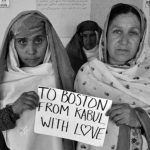
I don’t know Dzohkhar Tsarnaev. But the kids of several friends do because he graduated from their high school two years ago. And all of a sudden, in the same way Boston became a small town because I either directly knew a victim or am a degree or two away from others, I’m struck that I’m only one degree of separation from the perpetrators.
Last week as I reeled from the news of the bombing, like many others, I felt outrage towards the nameless and faceless bombers. How dare they attack my city? How dare they attack the marathon—an event that celebrates human pluck, endurance and commitment? How dare they kill an 8 year old, and two young women, one of whom came on the fall retreat I directed in October?
I’ve mourned for the victims. I’ve mourned for those who’ve lost limbs. I’ve mourned for our city and the sense of safety shattered.
Yet on Friday morning, as news broke about Dzohkhar—that he was 19 years old, that he had been popular, that he had been kind, that he was a good listener, that he didn’t fit the typical profile of the troubled youth who’ve committed acts of violence, my heart began to break for him as well.
Because as the mom of 3 teens, there’s nothing more obvious to me than that we send our kids into the world half-baked. I’m doing my best to help them develop morally, spiritually, physically, intellectually and socially so they can negotiate adulthood, but our world’s an increasingly complex place and it’s just hard to believe they’ll have all their ducks in a row in time.
Several books I read in my graduate level Adolescent Development class posited that adolescence is a social construct that arises from industrialization rather than a real life stage. That in agricultural or hunter-gatherer societies children just naturally morph into adulthood and all the sturm and drang associated with teenagers doesn’t exist. Indeed, that the conflict and identity formation challenges we see in modern adolescence have been created by the structures and strictures of modern society.
A week ago I went to the viewing for a friend’s 92 year old Chinese immigrant father who came to America as a child, but was sent back to China at 17 to get married to her 16 year old mother. Their marriage lasted 69 years. My 16 year old would be getting married right now in a culture like that. And so many complexities around negotiating holiness, chastity, sexuality, and relationships would be moot—she’d be having sex and bearing children in the next year. Yet I still see her as a child.
Yesterday my son asked whether 20 is too young to be married. Scott and I both said that it’s considered very young for those in our social class but maybe not that young for others. A horribly snobby comment, but true. I’m assuming my kids will get through college, work a little, maybe even do graduate school before considering marriage. Life is so complex today that it just takes time to get baked enough to become thriving and functioning adults these days.
That’s why I mourn Dzohkhar. Even though he’s a responsible man who will pay the cost for his actions, he also feels like just a kid. A kid who got swayed in the wrong direction and made some terrible decisions, decisions with life-altering consequences for himself as well as hundreds, perhaps thousands of others.
Just a half-baked kid.












